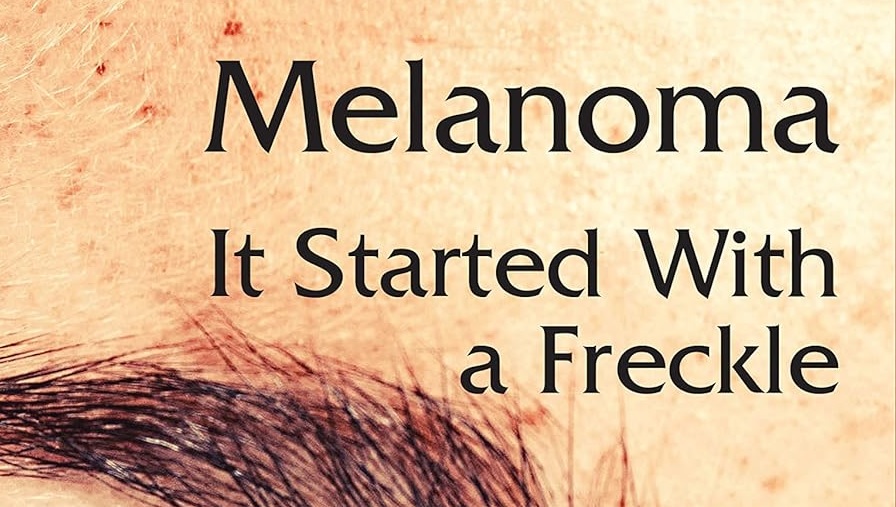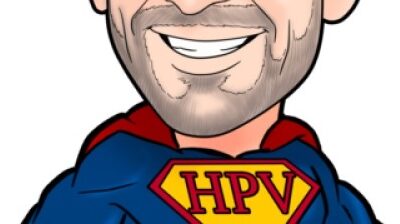This is an excerpt from David Stanley’s book, Melanoma: It Started with a Freckle.
From Chapter 5
I was not ready for the scene I saw when Cath and I got off the elevator for the Multidisciplinary Melanoma Clinic in Ann Arbor. These people were sick. Large pieces of face were missing. Entire mandibles, orbitals, ears, noses, sections of scalps. I worked in hospitals. I have taught human anatomy. I have dissected a cadaver. I was not ready for this. I rubbed my ear and plucked several stray hairs from my tragus. These people were now my peers. We all had melanoma.
Cath asked, “You alright?”
I was, I am certain, pasty-white. I looked around the waiting area again. My breath was shortened. My pulse accelerated. Up until this moment, my melanoma was an occasional speedbump on my road to wellness.
“I had a little thing,” I thought. “I had it removed. A slightly bigger thing returned in its place. I’ll get it removed, and boom, back to normal.”
These people were the first tangible vision I had in which the melanoma was not defeated. These people, potentially, were my future. These people started out exactly like me.
“Yep, fine.”
I lied. Cath knew I was lying. But at that moment of truth, as we both took in a potential future, telling her I was suddenly very scared didn’t seem to have much utility. Anyone with cancer who came across the Multi-Disciplinary Melanoma Clinic waiting area, would be, should be, scared. I had the inarguable sensation that in an alternate universe, I was one of those brave people missing substantial amounts of facial bone and skin. So, I lied to my wife.
Truth is, I didn’t have much choice but to act all right. The patient inventory ladies were waiting for me at one of the desks in a long row of cubbies.
One of the ladies called me over. She was a serenely placid woman. She gestured softly, to indicate we should take a seat.
“Um, no thanks,” I said. “Probably better if I stand.”
She smiled. Tranquil. Her mood was like Xanax.
“I understand. We get that a lot.”
She looked at Cath and smiled.
“It’s always the men.”
Seated in front of her screen, she ran through my history with me, forwarded by Dr. Barkey’s office. They knew I severed a wrist tendon from a ski injury in 1976. They knew I’d had knee surgery in college from a soccer injury in 1978. They knew I’d burst a bursa in my elbow from a bike racing accident in 1986. And a broken collarbone from another bike racing accident in 1988. They knew I’d had a chronic fatigue disease that lasted three months; cytomegalovirus, in 1994. I nodded in agreement as she ran through my list of injuries and illnesses, nearly all of them the result of pilot error.
I swear that jasmine and honeysuckle were wafting out of her computer. I could feel my blood pressure return to its normal, non-adrenalized state. I was aware that I could no longer feel my heartbeat thumping in my ears.
She reached for my hand.
I must have looked terribly startled.
She stopped and showed me what she had in her other hand.
“ID bracelet?”
Her eyes smiled. I do believe that on the inside, she was about to figuratively shoot Ovaltine out her nose but was far too gentle a soul to do so. She handed me a card. A maize and blue U-M hospital ID card.
“You’ll need that every time you return for treatment or a consult. Oh, and did you park in the ramp? We validate, you know. Why don’t you head over towards the intake desk? The nurse will come for you over there.”
I chuckled.
She cocked her head to the side and raised an eyebrow, questioning.
“You validate. It just struck me funny. Here we are, this cancer center, all these sick people, and still, everyone is pretty stoked to get free parking in Ann Arbor. Kinda funny.”
She looked at me and smiled.
“I hear the couch is pretty comfy.”
We sat, Cath and I. The couch was comfy. Not too cushy. I was seated just long enough to pull out a copy of Outside from inside my backpack. I leaned back and crossed my legs with the casual, devil-may-care insouciance which belongs to all cancer patients. At that very moment, a woman in scrubs, holding a chart, and bearing a perky smile came at a near-trot from the hallway into the vestibule near ‘our’ couch.
“Mr. Stanley? David Stanley?”
And boom, blood pressure, thumping in my ears, right back up where it belonged.
I found myself singing:
Bad boys, bad boys whatcha gonna do?
Whatcha gonna do when they come for you?
Bad boys, bad boys whatcha gonna do?
Whatcha gonna do when they come for you?
You’ll find more excerpts from David’s book here. And you can order the complete book from Amazon here:




